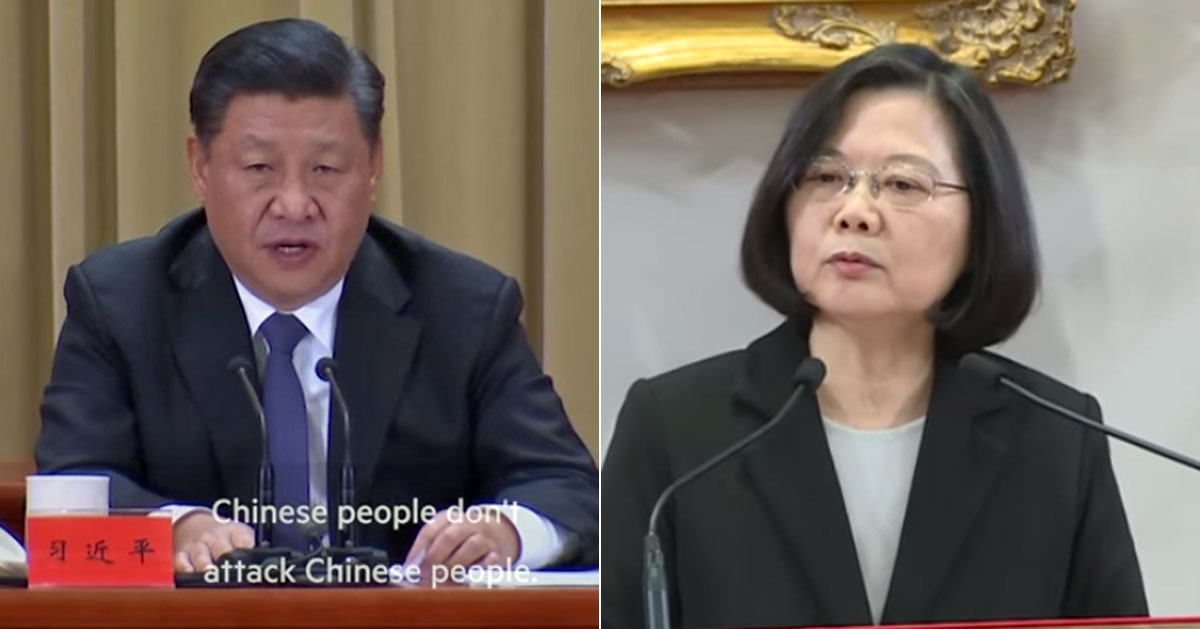The people of Taiwan has been urged to accept it "must and will be" reunited with China.
Chinese President Xi Jinping made this message clear during a speech to commemorate the 40th anniversary of "Message to Compatriots in Taiwan", marking four decades since the start of improving ties.
Conciliatory message with warnings
Xi reiterated Beijing's call for peaceful unification on a one-country-two-systems basis.
His conciliatory remarks were, however, peppered with warnings against separatist movements and agitations.
"It is a historical conclusion drawn over the 70 years of the development of cross-Strait relations, and a must for the great rejuvenation of the Chinese nation in the new era," Xi said at Beijing's Great Hall of the People, as reported by Xinhua news agency.
But he also warned that China reserved the right to use force.
Taiwan never formally independent
Taiwan has never formally declared independence from the mainland.
It is self-governed and de-facto independent, largely operating as a nation on its own, but Beijing considers the island to be a breakaway province.
After losing a civil war to the Communists, Chiang Kai-shek fled with defeated Nationalist forces to Taiwan in December 1949.
No peace treaty or formal end to hostilities has been signed, despite the deep business, cultural and personal links which exist today.
Xi's comments are in line with China's long-standing policy towards reunification.
Welcome dialogue and exchanges
The "Message to Compatriots in Taiwan" was issued by the Standing Committee of the National People's Congress -- China's Parliament -- on Jan. 1, 1979.
This was after the United States and China established relations.
The "Message" first proposed ending military confrontation across the Taiwan Strait through dialogue and welcomed exchanges between the two sides.
Before 1979, Taiwan-controlled offshore islands close to the mainland were routinely bombarded with artillery by China.
Independence a "dead end"
Xi said Taiwanese independence was "an adverse current from history and a dead end" and that Taiwanese people "must understand that independence will only bring hardship", adding Beijing would never tolerate any form of activity promoting Taiwanese independence.
He also said that both sides were part of the same Chinese family.
Instead, unification was "an inevitable requirement for the great rejuvenation of the Chinese people", he stressed.
He also stressed that relations with Taiwan were "part of China's domestic politics" and that "foreign interference is intolerable".
Tsai Ing-wen response
One day before Xi's speech, Taiwan's president Tsai Ing-wen said on New Year's Day that Beijing should accept the existence of Taiwan and use peaceful means to resolve its differences.
"I would like to call on China to face squarely the reality of the existence of the Republic of China on Taiwan," Tsai said, referring to the island's formal name.
After Xi's speech, Tsai told reporters during a news conference at the Presidential Palace in Taipei that China should "respect the insistence of 23 million people on freedom and democracy, and must use peaceful, on parity means to handle our differences".
She also said the island will not accept a "one country, two systems" political arrangement with China.
All cross-strait negotiations need to be on a government-to-government basis, she added.
Tsai said: "The vast majority in Taiwan resolutely oppose 'one country, two systems'. This is the 'Taiwan consensus'."
"We call on China to bravely step forward for democracy, for only by doing so can it truly understand the people of Taiwan's thinking and insistence."
China's assertiveness
In recent years, Beijing has become increasingly assertive over its claims and what it says is a key question of national sovereignty.
Other countries can only have diplomatic ties with China or Taiwan, not both, on China's insistence.
Beijing has been winning over Taipei's few international allies to cut diplomatic ties with the island and establish relations with China instead.
In November 2018, Tsai's separatist stance was dealt a blow as her political party saw a heavy setback in regional elections.
Watch Xi's and Tsai's speeches:
If you like what you read, follow us on Facebook, Instagram, Twitter and Telegram to get the latest updates.
